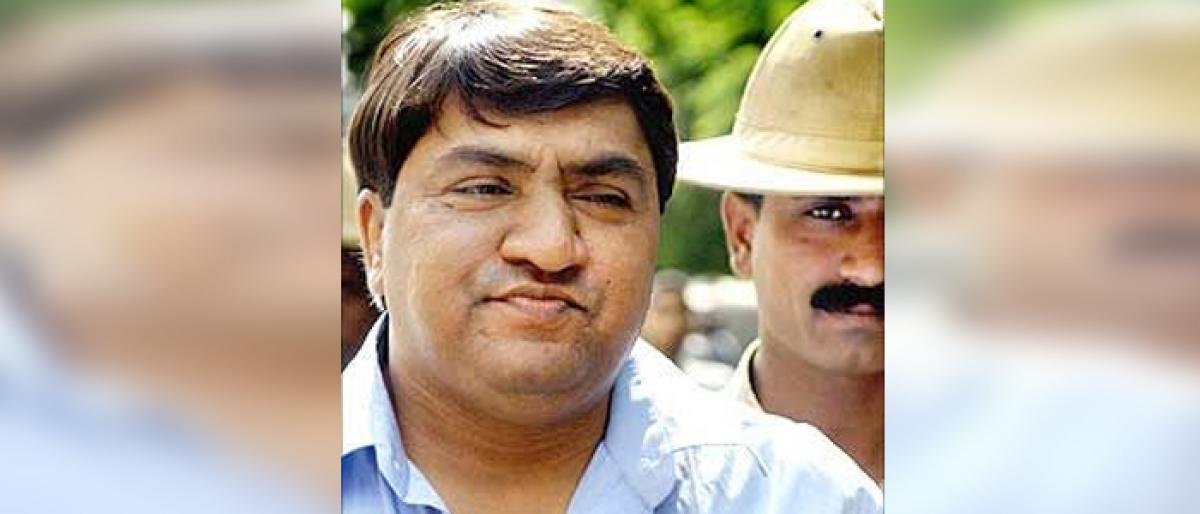Live
- Government Launches Uniform Diet Plan to Boost Student Health and Education
- Robust Security Arrangements for TSPSC Group-2 Exams in Jogulamba Gadwal
- National Lok Adalat Resolves 3387 Cases at Alampur Court
- ‘Get Set, Grow Summit 2024’ Focuses on Digital Detox for Families
- Stokes motivates his team to put in extra effort, says England pacer Potts
- From overcoming setbacks to leading India in U19 Women’s Asia Cup, Niki Prasad's amazing journey
- Driving Enterprise Security: Inside Venkata Reddy Thummala’s Leadership Journey
- Constitution debate: PM Modi hails 'Nari Shakti'; makes strong pitch for 'United Bharat’
- Abhijeet Bhardwaj: Revolutionizing Enterprise Analytics with Innovation and Expertise
- Bihar: Inquiry initiated against principal who went to buy veggies during school hours
Just In

Abdul Karim Telgi, who was convicted in multi-crore fake stamp paper racket, died on Thursday. Telgi was suffering from meningitis and was on ventilator. The 56-year-old Telgi, who was implicated in a multi-crore scam was serving his term in Parappana Agrahara Central Jail in Bengaluru after being sentenced to 30 years of rigorous imprisonment.
New Delhi: Abdul Karim Telgi, who was convicted in multi-crore fake stamp paper racket, died on Thursday. Telgi was suffering from meningitis and was on ventilator. The 56-year-old Telgi, who was implicated in a multi-crore scam was serving his term in Parappana Agrahara Central Jail in Bengaluru after being sentenced to 30 years of rigorous imprisonment.
Between 1992 and 2002, 12 cases were registered against Telgi relating to counterfeit stamps in Maharashtra alone and 15 cases in other parts of the country, according to The Financial Express. His tentacles spread across 12 states.
Son of a Class 4 employee in the railways, Abdul Karim 'Lala' Telgi, was first arrested in 1991 by Mumbai Police for cheating. He previously worked as a travel agent in Mumbai, where he developed underworld links. Telgi acquired a stamp paper licence in 1994 and procured machinery from Nashik Security Press declared as 'junk', using political connections.
Telgi and his cohorts made use of equipment discarded by the India Security Press (ISP) at Nashik and were able to get the assistance of technical personnel, both serving and retired, of the ISP.
According to the report, Telgi may have sold bogus stamps worth over Rs 20,000 crore in the past decade. His agents sold fake stamps worth Rs 50,000 every day. He merely filled the then present vacuum with his fake stamp papers.
According to The Financial Express, he had appointed as many as 350 people as agents who sold the fakes to bulk purchasers.
His cover was blown, when in Janaury 2003, Assistant Commissioner of Delhi Police Vijay Malik passed on information about a fake stamp racket to his counterparts in Pune.
A fine of Rs 202 crore was also imposed on Telgi. Some cases against him are still pending. He was lodged at the Central Jail at Parapana Agrahara in Bengaluru. Police started tapping a number of phones which finally led to the kingpin's arrest in November 2003 in Ajmer, India Today reported.
Initial figures said that the fraud totaled Rs 2,000 crore. That already massive figure has steadily been increased, in some circles, the estimate goes up to Rs 26,000 crore and even to Rs 32,000 crore. A couple of months before his arrest, he reportedly showered as much as the Rs 93 lakh on a bar girl in Mumbai's Grant Road.
The case was registered by the Bund Garden police in Pune in June 2003. Police recovered fake stamps worth Rs 2,200 crore from Bhiwandi, Hindustan Times reported. The then government formed a Special Investigation Team (SIT) headed by a senior officer.
The SIT, in its report—called the Jaiswal report—indicated connivance of officials of the India Security Press at Nasik in the transfer of appropriate technology, including stamps. However, no action was taken, the report added.
Forty-three other accused were sentenced to minimum of five years. Recently, Telgi was in thick of controversy when former DIG (Prisons) D Roopa alleged that prison authorities were giving him preferential treatment in the prison.
In July 2017, a report by DIG (Prisons) D Roopa revealed that Telgi used to get special treatment at the jail, and was allotted three to four inmates to give him a body massage. He was also being treated for AIDS.

© 2024 Hyderabad Media House Limited/The Hans India. All rights reserved. Powered by hocalwire.com







